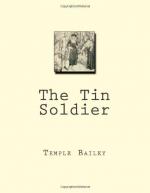More than once Peggy found it necessary to change the subject frantically. Drusilla supplemented her efforts.
But gradually the Captain’s manner froze. With a sort of military sixth sense, he felt that he had been asked to break bread and eat salt with a slacker, and he resented it.
After dinner Drusilla sang for them. Sensitive always to atmosphere, she soothed the Captain with old and familiar songs, “Flow gently, sweet Afton,” and “Believe me if all those endearing young charms.”
Then straight from these to “I’m going to marry ’Arry on the Fifth of January.”
“Oh, I say—Harry Lauder,” was Captain Hewes’ eager comment. “I heard him singing to the chaps in the trenches just before I sailed—a little stocky man in a red kilt. He’d laugh, and you’d want to cry.”
Drusilla gave them “Wee Hoose among the Heather,” with the touch of pathos which the little man in the red kilt had imparted to it as he had sung it in October in New York before an audience which had wept as it had welcomed him.
“Queer thing,” Captain Hewes mused, “what the war has done to him, set him preaching and all that.”
“Oh, it isn’t queer,” Margaret was eager. “That is one of the things the war is doing, bringing men back to—God—” A sob caught in her throat.
Drusilla’s hands strayed upon the keys, and into the Battle Hymn of the Republic.
“I have seen Him in the watch fires
of a hundred circling camps,
They have builded Him an altar in the
evening dews and damps,
I can read His righteous sentence by the
dim and flaring lamps,
His day is marching on—”
It was an old tune, but the words were new to Captain Hewes—as the girl chanted them, in that repressed voice that yet tore the heart out of him.
“He has sounded forth the trumpet
that shall never call retreat,
He is sifting out the hearts of men before
His judgment seat,
Oh, be swift, my soul, to answer Him,
be jubilant my feet,
Our God is marching on—”
The Captain sat on the edge of his chair. His face was illumined.
“By Jove,” he ejaculated, “that’s topping!”
Drusilla stood up with her back to the piano, and sang without music.
“In the beauty of the lilies, Christ
was born across the sea—
With the glory in His bosom that transfigures
you and me,
As He died to make men holy, let us die
to make men free,
While God is marching on—”
She wore a gown of sheer dull blue, there was a red rose in her hair—her white arms, her white neck, the blue and red, youth and fire, strength and purity.
When she finished the room was very still. The big Englishman had no words for such a moment. The music had swept him up to unexpected heights of emotion. While Drusilla sang he had glimpsed for the first time the meaning of democracy, he had seen, indeed, in a great and lofty sense, for the first time—America.




